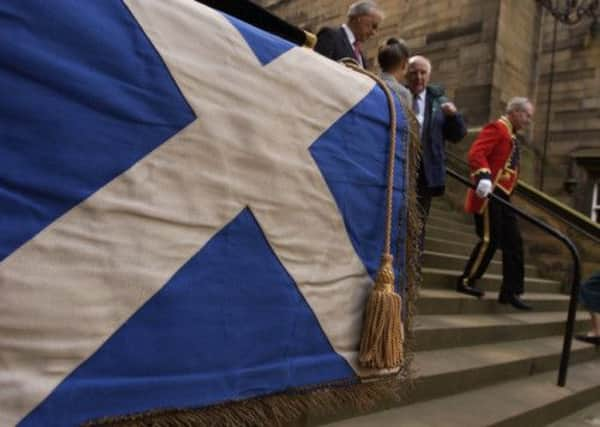Euan McColm: Church covenant tough for new state


What do we love most about these occasions? Isn’t it that they display the best of our comforting traditions? We do things properly, whether it’s winning Gold medals or burying former prime ministers to a soothing Dimbleby commentary.
So I was surprised by Deputy First Minister Nicola Sturgeon’s reaction to a Church of Scotland intervention into the independence referendum, last week. Three councils within the Church made a number of proposals, including a suggestion that there should be separate coronations for monarchs in an independent Scotland.
Advertisement
Hide AdAdvertisement
Hide AdSturgeon abruptly dismissed this as unnecessary: the Queen was already head of state in many different Commonwealth countries without the need for them to have their own coronations. She was correct about that, but she may have missed a trick. If the biggest stumbling block to the Nationalists’ dream of independence is fear of uncertainty among cautious middle Scotland, shouldn’t she be encouraging the sense of tradition evoked by the pageantry of a coronation?
The SNP recognised long ago that a majority of Scots feel no republican zeal. Their proposal that the Queen would remain the monarch of an independent Scotland reflects that and demonstrates, too, that the Nationalists understand the need to reassure wavering voters that they propose evolution rather than revolution. Some traditions are sacred.
Sturgeon’s response showed her roots (republican leftie, don’t you know?). Some of her colleagues are more open to the idea of a distinctively Scottish coronation ceremony for precisely the reason that it would mark, with some splendour, a new chapter in Scottish history. If we’re going to keep the Queen, argue some, let’s at least get the use of her. While she was cool on the idea of coronations, she welcomed, as politicians must, the Church’s participation in the debate. This welcome surely came with the understanding that the Kirk might be about to cause trouble.
Along with that coronation wheeze, the Church called for its role in society to be written in to the constitution of Scotland. The Kirk would be recognised as “a national church” (not, crucially, “the national church”). Not only would the Church like this status, but it would like to see the Scottish Government’s draft constitution well in advance of the referendum.
From within the Church I hear comforting words. This is not a power play, but the beginning of a debate about its relationship with the state. That relationship already has some legal basis. The Articles Declaratory which allowed the union of the Church of Scotland and the United Free Church are given legal weight under the Church of Scotland Act 1921, which recognises the Kirk, officially. Might not this status, it asks, be incorporated into the constitution?
Probably not. In senior Nationalist circles, there isn’t much appetite for a constitution that gives special recognition to any church. Instead, there’s a lean towards a “people’s constitution”, enshrining the rights of the individual to follow whichever, if any, religion they might choose. The Kirk has a “debate” on its hands if it’s to change that.
The Scottish Government will have to tread carefully, however. It’s not dealing with political amateurs, here. The timing of the Church’s intervention demonstrates some guile. The Scottish Catholic Church has been through the most torrid few months, with controversy over its apparent obsession with same-sex marriage finally eclipsed by the catastrophic downfall of its former leader Keith O’Brien over allegations of inappropriate conduct towards junior members of the clergy.
With the Catholic Church in Scotland rather wounded and sidelined for the time being, the Kirk has stepped in to seize the initiative on this debate. There’s some political muscle on show as it applies for the vacancy of senior religious voice on the independence issue. This matter could get messy. There’s a firm belief among a large number of Catholics, including Nationalist candidates and elected members, that the right to a faith education should be enshrined in a Scots constitution. Some members of the Church would like to see Roman Catholic schools, specifically, given constitutional protection.
Advertisement
Hide AdAdvertisement
Hide AdIt’s not difficult to see how this creates difficulties for the SNP (in this instance, the unionist parties are excused from providing answers – nobody expects them to propose a constitution for an independent country, after all) with different Churches piling in from different angles. One will want “this” protected, another will demand “that” is recognised. Concessions to one would necessitate concessions to another, and so on. The SNP has a lot of new tummies to tickle with the Kirk’s declaration of jaw-jaw over independence.
It’s worth mentioning there’s some disquiet in the Scottish Labour camp about the nature of the Kirk’s intervention. Some suggest it’s evidence of pro-independence sentiment at the top of the church. Church sources, however, insist those behind the proposals made this week are from both unionist and Nationalist camps. That call for advance publication of a draft constitution has a tone in its voice. Heaven forbid that men and women of God might play dirty, but isn’t the subtext that the Kirk’s advice to members on the independence issue will depend on how that declaration of our nationhood accommodates its wishes?
Nicola Sturgeon may yet regret welcoming the Church’s participation in the debate. Meeting its demands, or finding a workable compromise to keep it and other faith groups happy, will be a hell of a challenge.
Twitter: @euanmccolm